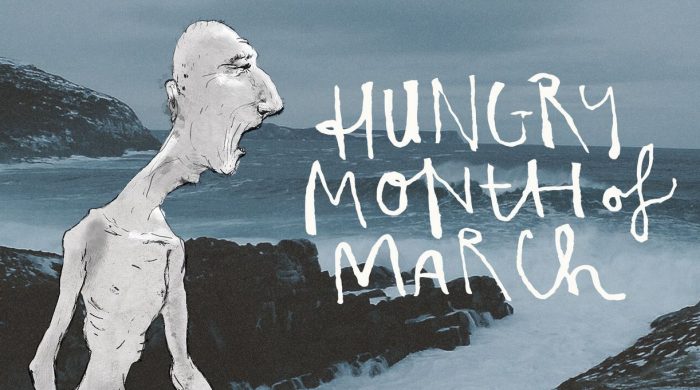
March 29, 2017 – Montreal – National Film Board of Canada (NFB)
Now available online at NFB.ca/hungry and viewable on all web browsers on mobile, tablet and computers, Newfoundland and Labrador filmmaker Rosemary House’s interactive video anthology Hungry Month of March shows how a flowering of haute cuisine in this easternmost Canadian province is steeped in the tradition of sustainability and self-sufficiency―and the memories of leaner times from the not-too-distant past. A Rock Island Productions/National Film Board of Canada co-production, with the participation of the Newfoundland and Labrador Film Development Corporation, Hungry Month of March features 14 short profiles of 10 suppliers who do the kind of work that almost everyone in the province’s remote outport communities used to do―when people were self-sufficient by necessity.
Right up until the 1960s, there were no roads connecting all the outports along 29,000 kilometres of Newfoundland’s coastline. Supplies had to come by boat, into the harbours that froze solid in winter. People fed themselves by the earth and sea and sky, with food harvested, pickled and preserved to get through the winter and the long, hungry month of March. If winter came early or stayed late, if someone got sick, if guests arrived, if berries were sparse―it called for a lot of improvisation in the kitchen, especially during March.
Newfoundlanders profiled in the anthology follow many of yesterday’s traditions, some of these traditions have been adapted over time. The suppliers profiled in Hungry Month of March are:
- Jeremy Carter at his organic farm in St. John’s
- Keith Morry and his pré-salé lambs on Ship Island
- Marie and Aubrey Payne at a cod-pot fishery on Fogo Island
- Lori McCarthy foraging at the seashore in Avondale
- Alf Coffin’s garden by the sea in Joe Batt’s Arm
- Murray McDonald and the quintessential root cellar
- Peter Burt making salt from the sea at Logy Bay
- Alan Ash snaring rabbits in Hants Harbour
What gives the emphasis on local food a fresh twist in these globalized times is the question of food security. Newfoundlanders have gone from producing a healthy percentage of their own food to producing just a small fraction. Everything now comes by ferry from the mainland of Canada, an eight-hour journey across the Gulf of St. Lawrence. Three short days without ferries and supermarket shelves begin to go bare.
The suppliers behind Newfoundland’s local cuisine are also part of a global movement, joining farmers and chefs around the country and the world who make use of local sources to feed body and soul.
Written, directed and edited by Rosemary House, Hungry Month of March was developed by Patrick Matte and designed by Aubyn Freybe-Smith. Cinematography is by Nigel Markham, with illustrations by Bruce Alcock. Hungry Month of March is produced by Annette Clarke, Dana Dansereau and Nicholas Klassen for the NFB, and Rosemary House for Rock Island Productions. The executive producers for the NFB are Annette Clarke (Quebec & Atlantic Studio) and Rob McLaughlin (Digital Studio)
Quick Facts
About the director
In 1990, St. John’s-based director Rosemary House made the award-winning short When Women Are Crazy. Since then she’s directed over 20 films, including the feature comedy Violet (2001) starring Mary Walsh and Peter MacNeill, and NFB docs Rain, Drizzle and Fog (1998) and Salvation (2002), which was nominated for the Donald Brittain Award. Her other films include Bloomsday Cabaret (2004), nominated for a Best Direction Gemini, Christopher House: Ahead of the Curve (2007), and Hold Fast (dir. Justin Simms).
Related NFB projects
The Hungry Month of March is the latest project this year from the NFB’s Quebec & Atlantic Studio to take a fresh look at the social and environmental impact of food. Named Best Canadian Feature at the Planet in Focus Environmental Film Festival in Toronto, Peter Svatek’s Theater of Life (Triplex Films/NFB/in association with Phi Films) brings together top chefs from around the world, including Jeremy Charles from St. John’s, as Italy’s Massimo Bottura transforms surplus food from Expo 2015 in Milan into delicious and nutritious meals for the hungry. HAND.LINE.COD., a short documentary by Newfoundland filmmaker Justin Simms, follows traditional fishers in the waters off Fogo Island who are leading a revolution in sustainable fisheries. Winner of the award for Best Atlantic Filmmaker at the Lunenburg Doc Fest for PEI filmmaker John Hopkins, Bluefin immerses audiences in a tale of epic stakes set in North Lake, PEI, the “tuna capital of the world.”
–30–
Associated Links
Rock Island Productions
Newfoundland and Labrador Film Development Corporation